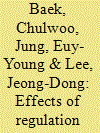|
|
|
Sort Order |
|
|
|
Items / Page
|
|
|
|
|
|
|
| Srl | Item |
| 1 |
ID:
132603


|
|
|
|
|
| Publication |
2014.
|
| Summary/Abstract |
We propose a competitiveness index for the electricity industry based on efficiency, stability, and growth factors identified from previous studies subject to data accessibility. These are then weighted appropriately through the application of the analytical hierarchy process. This index is an alternative tool to capture the diverse characteristics of the electricity industry in order to analyze performance after deregulation. Using the competitiveness index, we analyze the effect of regulation change in specific economic environments represented by the level of economic development, energy intensity, and manufacturing share, for example. According to the results, deregulation generally increases competitiveness, but the effect depends on the economic environment and the type of regulation. Deregulating entry and vertical integration to increase competitiveness is more effective in countries where the level of economic development, energy intensity, and manufacturing share are low. The manner in which the privatization effect is related to the economic environment is, however, unclear.
|
|
|
|
|
|
|
|
|
|
|
|
|
|
|
|
| 2 |
ID:
080029


|
|
|
|
|
| Publication |
2007.
|
| Summary/Abstract |
China's economic development is characterized by progressive integration with international production chains as an assembly producer. Japan and South Korea are the major partners providing intermediate products to China. The present paper analyzes the Chinese intermediate sector's present condition and evolutionary characteristics revealed in bilateral trade with Japan and South Korea. The analysis uses the framework of new trade theory represented by "intra-industry trade". Trade statistics from 1997 to 2004 are analyzed using the database published by the OECD. Results show that China's inter-industrial evolution is characterized by its expanding positioning in the manner of the flying geese development paradigm of Asian countries. Furthermore, intra-industrial evolution is characterized by a concentration on price competitiveness. The framework and results of the industrial analysis presented in this paper assist in the understanding of China's manufacturing evolution and of the policy-making decisions taken in the process.
|
|
|
|
|
|
|
|
|
|
|
|
|
|
|
|
| 3 |
ID:
117265


|
|
|
|
|
| Publication |
2013.
|
| Summary/Abstract |
The Korean electricity industry saw significant changes following the reform in April 2001. Until the last decade, the industry was monopolized by the Korea Electric Power Corporation (KEPCO), a state-owned, vertically integrated company. The 2001 reform divided KEPCO's power generation division into six power generation companies (GENCOs), with the aim of improving efficiency and introducing competition in the electricity industry. In this study, we used capital total factor productivity (KTFP) to analyze profit changes from fixed input capital, and an index number profit decomposition (INPD) to examine the sources of the profit changes. We investigate the industry thoroughly from three points of view: the overall industry over time; the power generation sector by company; and the transmission and distribution sectors of the Korea Electric Power Corporation (KEPCO). Next, we measured how the profits from productivity growth were distributed to consumers, fuel suppliers, employees, and company owners. The results suggest that a more reasonable price system for both wholesale and consumer prices needs to be implemented prior to the privatization and deregulation of the Korean electricity industry.
|
|
|
|
|
|
|
|
|
|
|
|
|
|
|
|
|
|
|
|
|